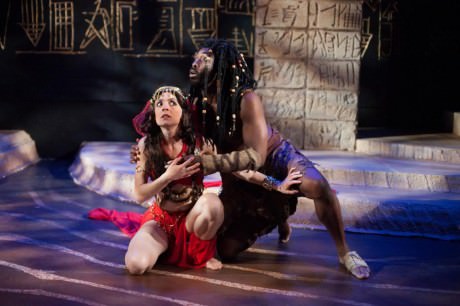It’s not often that a company can so completely remake a piece of history and claim it as their own. Gilgamesh is an amazing display of storytelling, and the production is a fantastic example of Constellation Theatre Company’s dedication to integrating multiple art forms in their work.

A collaboration between Pulitzer Prize-winning poet Yusef Komunyakaa and dramaturg Chad Gracia, Constellation’s Gilgamesh is a new take on the ancient Sumerian legend. The rule of the tyrannical god-king Gilgamesh (Joel David Santner) is threatened by the arrival of Enkidu (Andreu Honeycutt) in his kingdom. Somewhere between man and beast, Enkidu refuses to bow down to a man who he thinks is a bad king. The two fight each other to a standstill, and a friendship develops that changes both men. When Gilgamesh’s pride leads to Enkidu’s death, the king must journey into the underworld to bring his companion back to life. Santner’s Gilgamesh is likeably arrogant, a king who truly holds sway by divine right and force of will. But it is Honeycutt’s Enkidu that really electrifies the stage. The play opens with Enkidu’s arrival in the world, and it feels diminished by his absence in the second act.
Constellation has enlisted the aid of Tom Teasley, the master percussionist and multiple Helen Hayes Award winner, to help them bring Gilgamesh to life. Providing live accompaniment from the moment the audience enters the theater, Teasley works as hard as any of the actors in the cast, and with fewer breaks. The instrumentation is (if you’ll excuse the phrase) pitch perfect, with Teasley’s varied influences lending the production a timeless quality. With Teasley’s music as a foundation, Constellation creates a language of dance and movement.
The ensemble cast (Nora Achrati, Charlotte Akin, Katy Carkuff, Ashley Ivey, Emma Crane Jaster, Jim Jorgensen, and Manu Kumasi) does a magnificent job of building a world where dance, movement, music, and language are all essential aspects of existence. Key words of the play – Gilgamesh, god, man, Enkidu, death, and many others – are accompanied by gestures and movements. The company makes the combination seem so natural that it seems less an invented language and more a discovered one.
The entire movement team (Fight Choreographer Casey Kaleba, Choreographer Emma Crane Jaster, and Movement Coach Gwen Grastorf) really should be commended. It’s the perfect vehicle for conveying a mythic story, and led to what may be the first time that I’ve ever really looked forward to a chorus providing exposition. While there are some standout roles in the production, such as Craster’s Woman of Red Sashes or Ivey’s boatman Urshanabi, the cast is at its best when working together to establish the nature of the show’s reality. Whether working together to puppet the Bull of Heaven or simply being trees in the forest, the ensemble is the key to a believably mythic world.

But the mythic nature of Gilgamesh can sometimes leave it a curiously bloodless affair. The old theater mantra “show, don’t tell” is consistently broken due to the intrusion of the admittedly poetic text. Gilgamesh tells us how grieved he is by Enkidu’s passing; characters move from one episode to another by mythic logic rather than dramatic necessity. We’re not entirely sure why Ishtar must punish Gilgamesh and Enkidu for slaying Humbaba, but she must, and so she does. We don’t have enough initial context to understand Gilgamesh’s decision to seek out Utnapishtim, but he says he must, and so he does. Fight scenes are technically impressive, but aside from the first encounter between Gilgamesh and Enkidu there doesn’t seem to be anything truly at stake.
None of this keeps Gilgamesh from being an impressive achievement. In directing Gilgamesh, Constellation’s Artistic Director Allison Arkell Stockman has done a truly remarkable bit of world-building. What might seem trite or silly in another production simply fits with Gilgamesh‘s internal logic. It’s the mark of a strong production and a strong company: Constellation asks us to suspend our disbelief, and we’re happy to go along for the ride. And while the technical aspects are thrilling in and of themselves, Constellation also manages to hit some big questions about identity and fate along the way. I’d say more on that count, but I encourage you to see the production and let Constellation make their own case.
Running Time: Approximately two hours, with a fifteen-minute intermission.
Gilgamesh plays through June 2, 2013 at Constellation Theatre Company at Source – 1835 14th Street NW, in Washington, D.C. For tickets, call the box office at (202) 204-7741, or purchase them online.





